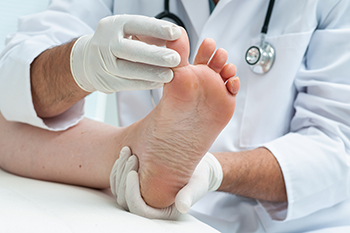3320 North Buffalo Drive
Suite 107
Las Vegas, NV 89129

Athlete’s foot, or tinea pedis, is a common fungal infection that causes redness, itching, and flakiness. The skin may also begin to crack between the toes and on the soles of the feet. Additionally, changes in skin color and a foul smell may accompany athlete’s foot. One does not have to be an athlete to get athlete’s foot. This ailment got its name from being common among athletes who frequent gyms and locker rooms, that are breeding grounds for athlete’s foot fungus. Anyone can get athlete’s foot, and the chances may increase with a weakened immune system, poor foot hygiene, or possibly from diabetes. This condition is contagious, and can be spread through contact with infected skin or through indirect contact with clothing, towels, or floors. It is beneficial for athlete’s foot to be treated promptly, and if left untreated, it may become worse, and affect the toenails. If you have athlete’s foot, it is suggested that you consult with a podiatrist who can provide you with treatment and prevention methods.
Athlete’s Foot
Athlete’s foot is often an uncomfortable condition to experience. Thankfully, podiatrists specialize in treating athlete’s foot and offer the best treatment options. If you have any questions about athlete’s foot, consult with one of our podiatrists from Summerlin Foot & Ankle. Our doctors will assess your condition and provide you with quality treatment.
What Is Athlete’s Foot?
Tinea pedis, more commonly known as athlete’s foot, is a non-serious and common fungal infection of the foot. Athlete’s foot is contagious and can be contracted by touching someone who has it or infected surfaces. The most common places contaminated by it are public showers, locker rooms, and swimming pools. Once contracted, it grows on feet that are left inside moist, dark, and warm shoes and socks.
Prevention
The most effective ways to prevent athlete’s foot include:
Symptoms
Athlete’s foot initially occurs as a rash between the toes. However, if left undiagnosed, it can spread to the sides and bottom of the feet, toenails, and if touched by hand, the hands themselves. Symptoms include:
Diagnosis and Treatment
Diagnosis is quick and easy. Skin samples will be taken and either viewed under a microscope or sent to a lab for testing. Sometimes, a podiatrist can diagnose it based on simply looking at it. Once confirmed, treatment options include oral and topical antifungal medications.
If you have any questions, please feel free to contact our office located in Las Vegas, NV . We offer the newest diagnostic and treatment technologies for all your foot care needs.